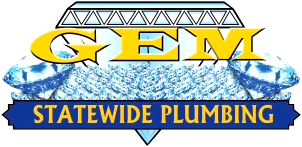FAQs
Gem Statewide Plumbing
Have a plumbing-related question? We have the answer. Check out these FAQs and give us a call today for more information!
-
What are the benefits of pipe lining?
Sewer pipe lining benefits include high efficiency, cost-effectiveness, minimal property damage, durability, and often improved water flow.
-
How does pipe relining work?
Drain pipe lining acts by repairing pipes from within. A malleable liner made of fiberglass or polyester curated with resin is inserted into the original, existing pipe. Soon enough, this special resin hardens to act as a brand-new pipe within the existing pipe.
-
How long does pipe relining last?
In our experience, sewer pipe lining that is properly installed and maintained can last you and your home 50-60 years.
-
What material pipes can be relined?
Pipes made from galvanized steel, PVC, cast iron, copper, clay, fiberglass, high-density polyethylene, and various other materials can all be relined by professional plumbing companies.
-
What type of pipe can be relined?
Depending on the condition, storm sewers, sanitary sewers, gas pipes, vertical and horizontal pipes, and many others can be relined to prevent clogged drains.
-
How do tankless water heaters work?
Tankless water heaters work by sending cold water through a heat exchanger, using a heat element or gas burner, to heat your water to your desired temperature. According to Forbes, the average cost to replace a water heater is around $1,200. Your local plumbers at Gem Statewide Plumbing can give you even more information!
-
What are some benefits of a tankless water heater?
Tankless water heaters have many benefits such as a longer lifespan (compared to traditional water heaters), less maintenance, less space, and may even reduce energy bill costs. Contact one of your top local plumbing companies today for more information.
-
Why should I replace cast iron pipes?
If you've noticed repeated clogged drains, blockages, or leaks, it's in your best interest to have them inspected or replaced. Keep in mind that cast iron pipes deteriorate as early as 25 years after installation based on our experience, so any house built before the 1980s is at risk.
-
How can I tell if my cast iron pipes are broken?
In most common cases, you may experience water damage, worsening leaks, high water costs, and foul smells coming from your pipes or any clogged drains.
-
How do I inspect my pipes?
Any licensed local plumbers at Gem Statewide Plumbing can inspect your pipes with a video scope.



Share On: